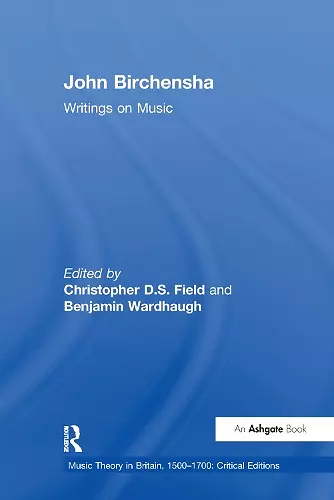John Birchensha: Writings on Music
Benjamin Wardhaugh author Christopher DS Field author Benjamin Wardhaugh editor
Format:Paperback
Publisher:Taylor & Francis Ltd
Published:19th Dec '18
Currently unavailable, and unfortunately no date known when it will be back
This paperback is available in another edition too:
- Hardback£150.00(9780754662136)

John Birchensha (c.1605-?1681) is chiefly remembered for the impression that his theories about music made on the mathematicians, natural philosophers and virtuosi of the Royal Society in the 1660s and 1670s, and for inventing a system that he claimed would enable even those without practical experience of music to learn to compose in a short time by means of 'a few easy, certain, and perfect Rules'-his most famous composition pupil being Samuel Pepys in 1662. His great aim was to publish a treatise on music in its philosophical, mathematical and practical aspects (which would have included a definitive summary of his rules of composition), entitled Syntagma musicæ. Subscriptions for this book were invited in 1672-3, and it was due to be published by March 1675; but it never appeared, and no final manuscript of it survives. Consequently knowledge about his work has hitherto remained extremely sketchy. Recent research, however, has brought to light a number of manuscripts which allow us at last to form a more complete view of Birchensha's ideas. Almost none of this material has been previously published. The new items include an autograph treatise of c.1664 ('A Compendious Discourse of the Principles of the Practicall & Mathematicall Partes of Musick') which Birchensha presented to the natural philosopher Robert Boyle, and which covers concisely much of the ground that he intended to cover in Syntagma musicæ; a detailed synopsis for Syntagma musicæ which he prepared for a meeting of the Royal Society in February 1676; and an autograph notebook (now in Brussels) containing his six rules of composition with music examples, presumably written for a pupil. Bringing all this material together in a single volume will allow scholars to see how Birchensha's rules and theories developed over a period of fifteen years, and to gain at least a flavour of the lost Syntagma musicæ.
’Reading this volume increases one's curiosity about the place of the Royal Society within Resoration London's musical life... This is a substantial volume, well indexed and with quite an extensive bibliography; it will be of particular interest to specialists in music theory, but it also gives some valuable glimpses of the wider intellectual climate of Restoration London.’ The Consort ’The volume represents the ne plus ultra for a scholarly edition. Not a name, concept or source is mentioned that does not receive a gloss or complete commentary. The introductions and critical apparatuses themselves could serve as a bibliographical entrée to the scholarship of mid-17th-century music theory...a magisterial achievement and certainly the last word in presenting the ideas of this erudite musician caught in the spirit of the Scientific Revolution as he struggled to apply mathematics to the art of music.’ Early Music '... not only a comprehensive collection of Birchensha's writings, but also a fascinating account, both through those writings and the editors' extensive and sensitive commentary upon them, of the career and personality of this 'rare artist'... The editors' contribution both to the conception and execution of this volume is commendable, especially in the extended notes to each chapter which clarify terminology both musical and mathematical, fill in indispensable context, and cross-reference with other theoretical texts. The lengthy Introduction, too, provides a concise and informative account of Birchensha's life and an invaluable overview of his writings and their many interrelationships; it will surely remain the standard biographical account for many years to come. The transcription is exemplary in its clarity and attention to detail.' Viola da Gamba Society Journal '... comprehensive and authoritative... The main achievement of this volume is [...] to make available in a critical edition a body of work, much of which was previously unknown and
ISBN: 9781138376212
Dimensions: unknown
Weight: 453g
342 pages